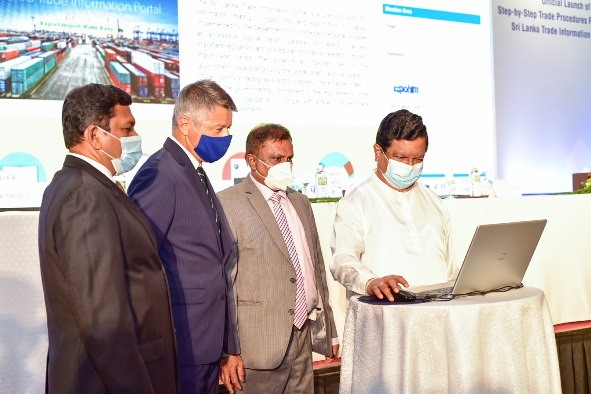February, 13, 2021

A new and integral step-by-step procedures functionality developed by the Department of Commerce (DoC) of Sri Lanka was launched as an enhanced feature of the Sri Lanka Trade Information Portal (SLTIP) in Colombo recently. The new ‘one-stop-shop’ feature developed within the framework of the EU-Sri Lanka Trade Related Assistance project, funded by the European Union (EU) with the technical support of the International Trade Centre (ITC), is set to enormously benefit Sri Lankan traders by providing transparent and up-to-date trade-related information in an interactive, user-friendly platform.
With the launch of the new functionality, traders will now have easy access to a wealth of information at their fingertips. The functionality captures all trade procedures in a sequential order including the relevant authorities to meet at each step, costs to be incurred, required time, necessary documentation, legal justification, and the submission of complaints.
Extending his gratitude to the Delegation of the European Union for their assistance as well as ITC for their technical support in implementing this project, Minister of Trade Hon. Dr. Bandula Gunawardena said, “the step-by-step functionality provides useful, clear and updated information in an easily accessible manner for business operators.”
In 2018, the DoC launched the SLTIP to facilitate better trade practices in the country. For over two years, ITC has been working closely with the DoC upon their request for assistance to enhance the user-friendliness of the SLTIP’s features to meet the demanding pace and compliance of global trade. This resulted in collaborating with 18 border regulatory agencies in Sri Lanka to collate, validate and detail accurate, certified and up-to-date trade formalities and related regulatory information pertaining to 29 product groups on the new platform. With such detailed step-by-step guidance, traders can now lower costs and time of doing business when moving goods in and out of the country, conduct their trade operations more efficiently and enhance their international business competitiveness.
In his address, H.E. Denis Chaibi, Ambassador, Delegation of the European Union to Sri Lanka and the Maldives said, “This project is an example of what the EU can achieve with Sri Lanka for the benefit of economic operators from Europe and Sri Lanka. It is a good indicator of our overall relationship which is characterised by engagement, respect and results.” He went on to explain that the EU is following the priorities of the government which is indicative in their support for this project.
The new platform awakens insights into existing procedures and measures when conducting trade with Sri Lanka and could be used as a benchmark in considering simplification of border procedures. All information has been made available in English, Sinhala and Tamil to ensure equal access to all trade stakeholders that have an interest in international trade also with a view to strengthen domestic value chain linkages.
Mr. Ananda Dharmapriya, Actg. Director General of Commerce expressed that the DoC was delighted to host the SLTIP, which was the first tangible deliverable of the Trade Facilitation implementation plan of Sri Lanka and to also embed this functionally to provide detailed information on export and import procedures on selected products.
Dr. Dayaratna Silva, National Project Coordinator, EU-Sri Lanka Trade-Related Assistance in his speech said that although border procedures and formalities are necessary and legal requirements, they can be cumbersome and excessive, creating barriers for Sri Lankan businesses. “The step-by-step functionality we are launching today is a step forward and only the beginning of a long journey,” he added.
The step-by-step feature was implemented in partnership with the United Nations Conference on Trade and Development (UNCTAD), while further financial support was provided by the Deutsche Gesellschaft für Internationale Zusammenarbeit GmbH (GIZ) to enhance the platform and extend the product coverage. The functionality will also assist the Government of Sri Lanka to comply with a fundamental transparency provision of the World Trade Organization’s Trade Facilitation Agreement (TFA) by providing web-based information and documentation pertaining to imports, exports and transit procedures.
Video Story